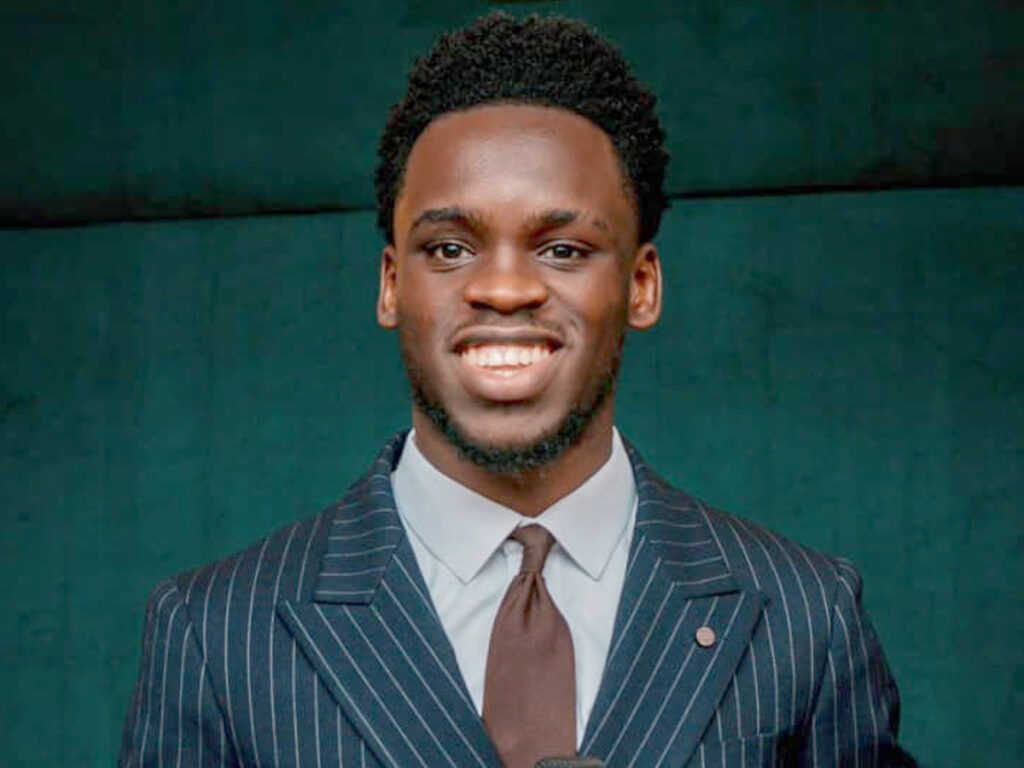Miracle Nwankwo is a computer science graduate of Babcock University, a serial entrepreneur, and the Chief Executive Officer (CEO) of Veefin Solutions Nigeria. With a background in product innovation, strategic partnerships, and digital growth, he is passionate about creating financial systems that are efficient, inclusive, and future-ready. In this interview by GRATEFUL OGUNJEBE, he speaks about his entrepreneurial journey, his work at Veefin Nigeria, among other things.
While studying computer science at Babcock University, did you imagine yourself working in the technology sector? What contribution did you make to the technology ecosystem as an undergraduate student?
The reason I studied Computer Science at Babcock University was because I had the desire to start a tech company. I always wanted to create an app, something that would be of value to people to solve problems, and the best way to do it is through technology, and the best course for it is computer science.
Before I went to the university, when I was in secondary school, I remember trying to create a social media app. I remember trying to start a Fintech company. I started a small start-up for my class, where I was saving a portion of their pocket money for them. I partnered with two or three of my friends and started a mini bank. Also, many people saw me as a responsible, trustworthy guy. So, they trusted me with their money. I was able to save about 50 dollars then. At the end of the term, I gave everyone their money, and according to our agreement, I took a percentage of what I saved for them, about 10 per cent.
I have always had that desire for business and for creating value. Mark Zuckerberg is someone I want to be like. While I was at Babcock University, I tried creating some startups. I pitched some of my ideas and solutions at the Wema Bank event held every year, a hackathon competition in which I came second. While I was doing my industrial training (IT), I started my first start-up, which was a book clinic. It was an online healthcare service booking, and I raised about $18,000 for it. Two years later, I graduated from the university, and I am now in fintech. I am serving as the chief executive officer (CEO) of Veefin Solutions Nigeria, the Nigerian arm of the global fintech company based in India.
How would you describe your life and work immediately after graduation, national service, and brief engagements with tech firms before starting your own company?
I would say it was very challenging. I have not done my NYSC yet. I just finished school last year, and when I finished, I was always working on my start-ups, but not into it full-time, because then I got a job at a cosmetics company where I was working as the e-commerce manager. I did that while working on the contract for Veefin Solutions Nigeria. After a few months, everything materialised, and I quit my full-time job and focused on my company fully. It was quite challenging. I learnt a lot of things. I saw many reasons I did not want to work for anybody, but to be self-employed.
At just 21, you became the CEO of Veefin Solutions. What does being a young CEO mean to you?
Being a young CEO is amazing. It is inspiring, especially the fact that it is rare to find young people my age doing what I am doing today. Many young people have just finished school, or have just finished their internship, or are doing their National Youth Service Corps (NYSC) programme, or have just gotten a job, or have not gotten any job yet. But having your own company, and as the CEO, is on a different level.
Veefin was conceived because of the work I did with my first start-up, Book Clinics, which introduced me to the global fintech company. They decided to appoint me to lead the expansion of the team in Nigeria.
My family also played a huge role. The first capital I raised for my business was from Family and friends. They showed me all the support I needed. I have very successful family members, people I can look at and draw strength from their stories because they have been where I want to be, so they can advise me. My family played a huge role in making me who I am today.
What unique Nigerian problems does Veefin Solutions seek to address, and how and where does it address these problems?
Veefin Solutions Nigeria is a technology platform. Our platform is for banks, financial institutions, and non-financial institutions that are into lending to corporate organisations or individuals. These loans take many steps before they are given out. We give the bank a technology platform to power that lending, from registration to verification to the management of the loan process to the disbursement of the loan.
The unique problem we want to address links to Nigeria’s lack of a scalable financial solution or platform. So, because of that, much working capital has been trapped, and many people and organisations are not able to access loans as they should.
With Veefin solutions Nigeria coming into the picture. We are going to be helping banks disburse more loans, unlocking working capital for small and medium enterprises (SMEs) or individuals.
You mentioned that Veefin’s platforms are used by banks in over 20 countries. That is a great feat. How did these banks across many countries come to know and use your solutions?
Veefin Solutions is a company that has been there since 2015, and we win the world’s best supplier chain financial platform three years in a row, 2022, 2023, and 2024. Veefin originated from India, and it is in about 20 countries, and we have over 500 clients globally, including some of the biggest banks in the world. We have some banks here in Africa. In India, we have the Central Bank of India, and many multinational banks are working with us.
So we have built that reputation globally, and now we are bringing that same brand, that same company, here in Nigeria, as an extension of the global brands in Nigeria. We are here to work with Nigerian financial institutions and non-financial institutions. Also, Veefin Solutions Nigeria is a group of companies that has several other companies under it. The functional company we have now under it is the supply chain finance platform, and we have other companies that we are launching. We also have a health company, which is a BookClinic; and Carebox, which is a hospital management company.
In your LinkedIn post about becoming a CEO at 21, you wrote, “Age is not a disqualifier. Execution is.” How were you able to beat the age factor that hinders many young Nigerian people in business?
I would say age is not a disqualifier. Even if you go abroad, to countries like America, you would see young people founding multi-billion-dollar companies. Mark Zuckerberg said that when he started, he did not know anything about building a company. He had never done anything like that before, but he figured it out on the way. You do not need a great experience to do great things or to build great companies.
I started my first company on time. I started at age 19, so that helped me a lot. I single-handedly onboarded 80 centres, about 15 locations in Lagos State. So, that repetition and that track record of the initial company I started was what spoke for me and got me noticed globally. I would say that the work I did with that company, the experience I gathered, and the advice and guidance from experienced people helped me. I do not think experience should be a disqualifier.
Employers would say that if you do not have up to five years’ experience, they would not hire you. I do not think experience should be a hindrance for young people to take on big roles or challenges. You have to look out for the passion, the track record of what they have done, not only in a particular thing, but also in how they have grown with it.
I think young people should get the opportunity to grow in whatever job they are in, instead of looking for people with 10 years’ experience. This is because, most times, due to the hunger in young people, their energy and ideas can sometimes yield better results than those with 10 years of experience who are lost in the constant change and innovation that we are currently facing in the 21st century. So I think age should not be a disqualifier.
Nigeria’s fintech space is highly competitive, with companies like Flutterwave and Paystack dominating. How is Veefin faring in the fintech industry? How do you plan to carve out a unique space for Veefin in the market?
Veefin has already carved out a unique space for itself. Most fintech start-ups and companies are mostly into airtime subscription, flight booking, and other payment solutions. However, our platform is not sold to the end consumers. It is more of a business-to-business company. We are doing business with banks, not the bank customers. It is just like when Paystack started. They had to give their software to a business that already had customers, and the customers of the business would make payments through their platform.
There is no supply chain finance platform here in Nigeria. You can only see an international brand coming to compete with us. So, there are many opportunities for Veefin. We have carved out a unique sector for us.
Also, in one of your recent posts, you stated that Africa should not be intimidated by the likes of Silicon Valley, that they should build what is unique to the continent and in their own terms. How do you propose young Africans go about this?
I believe African programmes are unique to Africa. There are some innovations in America, but they are not unique to us here in Africa, maybe because our culture, beliefs, and lifestyle are different. So, you cannot say, because it worked in America, you want to do it here with the same strategy. We can have an innovation like Cowry — they found out that people use public transport and decided to implement it. So, look at your market and get a solution unique to your market.
Although Veefin is a global company serving clients from all over the world, when we want to build a solution, it is not generic. We actually work with banks, understand their flows, niches, processes, and markets, and then build a custom solution that works best for them. The first step is to look at the problem that is unique to your market.
What three tech solutions would you want to see emerge from Africa within two years?
The type of technologies I would like to see emerge in Africa are innovations like electric vehicles and AI. For example, when you walk into a restaurant, an AI waitress would serve you; when you overspend, an AI gives you a ticket. In the fintech space, I would want to see more payment innovations apart from what we have now.
What does leadership mean to you? What were the most valuable lessons that you have learned about leading teams, especially those with members older or more experienced than you?
Being a leader is being able to push your company in the direction that you want it to go. You are like the captain of a ship. You are the one who drives the business in the direction of its success, goals, and expansion.
So leadership is being able to use everything within your means to sustain resources, talents, people, investors, relationships, connections, whatever you can use to derive that growth to take the company in the direction of where you want it to be. We may say there are some people older than me, but that is not really a thing, because for you to be a CEO, you are qualified. You have done a lot of work and made a lot of sacrifices, which your workers or coworkers respect.
I found out that people respect value because, if it were easier, everybody would own their own business. So, those who own businesses deserve respect. I do not face any challenges with older colleagues. I form more of a team with them, and I love to learn from them and see how they do what they do.
If you were to advise President Bola Tinubu on one policy change to boost fintech innovation in Nigeria, what would it be and why?
I would say we should make it much easier for young people who want to venture into fintech to do so. This is because right now, entering into the fintech business requires a lot of registrations and licensing, which are very expensive. Most young people who want to build fintech solutions do not have the money to purchase those licenses.
The president should make it easier for young people to launch innovative things without the hectic licensing. If the president does this, there would be more innovations in the fintech industry. He should make it affordable and easier to launch a fintech company in the country.
Looking back, what has been your biggest failure or setback as a CEO, and how did it shape your leadership style?
I would not call it a failure because everything that has happened today in my life or business is what has made me what I am today. Failure is an event, and there is something called ‘failing forward’, which is when your failures or your mistakes are actually a stepping stone to your success. So, I would not say I have failed.
However, there are some areas, like in my first start-up, where I noticed that before you launch a company, you need to know about your target market. The product must not come first before customers. Rather, customers should come before the product. That was the mistake I made that I would call a failure with my first start-up. I had the idea of building the product first before speaking to customers. When I finally spoke to the customers, I saw the sea is deeper than I thought. Speak with your intended customer, learn about them before building your product.
What is next for Veefin Solutions Nigeria? Where do you see the company and yourself in five years?
In the next five years, I see Veefin Solutions Nigeria being used by many banks in Nigeria, spanning into different sectors, which we plan to do. I see us becoming a multi-billion-dollar company here in Nigeria. I see a very good future for Veefin Solutions Nigeria.
Finally, what advice would you give to young Nigerians and Africans who aspire to break barriers in their fields but feel limited by finance, age, or circumstances?
The advice I would give them is to always dream big. There is a phrase from Tunde Onakoya that says you can do great things from a small place. My motto is dream big. Your environment or your circumstances can discourage you from pursuing some dreams. If you want to become a model, you can have the limitations of not being tall enough, pretty enough, or fit enough. Those circumstances have discouraged you, but if you want to be a model, still go for it. Your flaws should not stop you from being a successful model.
Most young people do not have access to resources, do not have experience running a business, and do not have connections. Many things are limiting young people from starting businesses or becoming CEOs.
Sometimes, because of how backwards our educational system is, some of us do not have the skills, and those who are willing to learn may not have access. But you should still dream big because when you give up and accept the reality of your circumstances, you will be defeated and remain that way. However, when you dream big, you can achieve anything you want. It does not matter where you are coming from.




